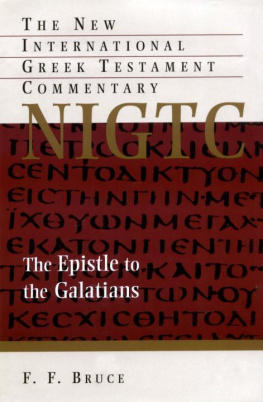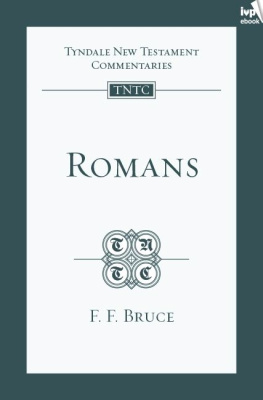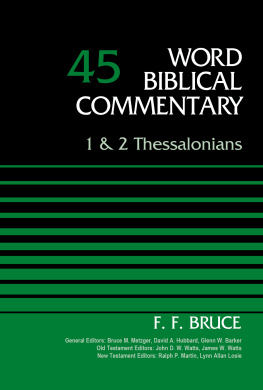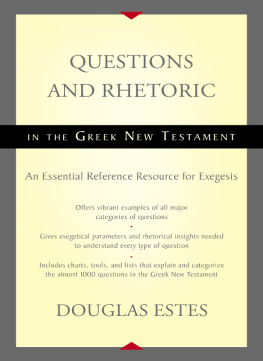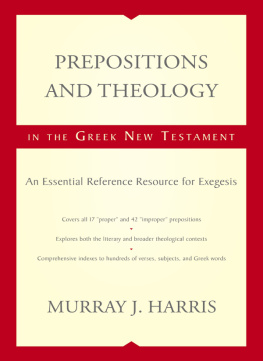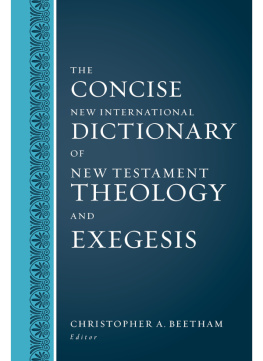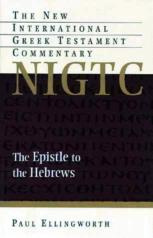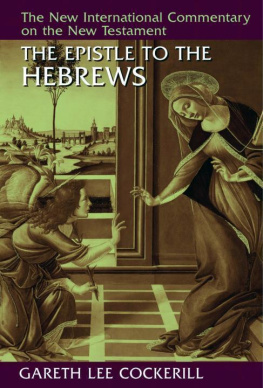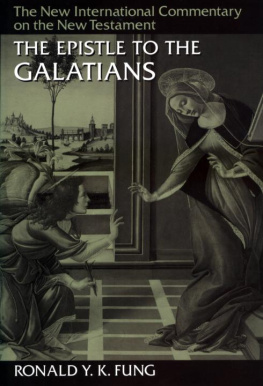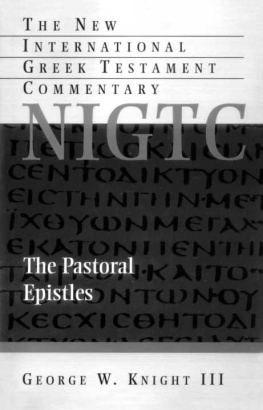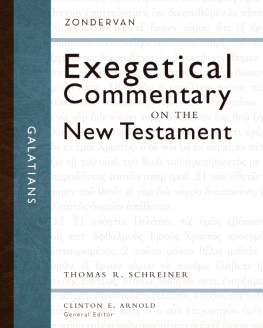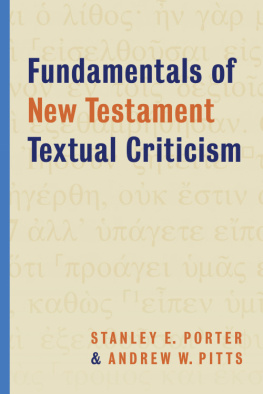THE NEW INTERNATIONAL
GREEK TESTAMENT COMMENTARY
Editors
1. Howard Marshall
and
W. Ward Gasque
THE EPISTLE TO THE GALATIANS
The New International Greek Testament Commentary
THE EPISTLE TO THE
GALATIANS
A Commentary on the Greek Text
by
F. F. BRUCE
Emeritus Professor
University of Manchester





TO
CHARLES FRANCIS DIGBY MOULE
in admiration, friendship and gratitude
CONTENTS
FOREWORD
While there have been many series of commentaries on the English text of the New Testament in recent years, it is a long time since any attempt has been made to cater particularly to the needs of students of the Greek text. It is true that at the present time there is something of a decline in the study of Greek in many traditional theological institutions, but there has been a welcome growth in the study of the New Testament in its original language in the newer evangelical schools, especially in North America and the Third World. It is hoped that The New International Greek Testament Commentary will demonstrate the value of studying the Greek New Testament and help towards the revival of such study.
The purpose of the series is to cater to the needs of students who want something less technical than a full-scale critical commentary. At the same time, the commentaries are intended to interact with modern scholarship and to make their own scholarly contribution to the study of the New Testament. There has been a wealth of detailed study of the New Testament in articles and monographs in recent years, and the series is meant to harvest the results of this research in a more easily accessible form. The commentaries will thus include adequate, but not exhaustive, bibliographies. They will attempt to treat all important problems of history and exegesis and interpretation which may arise.
One of the gains of recent scholarship has been the recognition of the primarily theological character of the books of the New Testament. This series will, therefore, attempt to provide a theological understanding of the text, based on historical-critical-linguistic exegesis. It will not, however, attempt to apply and expound the text for modern readers, although it is hoped that the exegesis will give some indication of the way in which the text should be expounded.
Within the limits set by the use of the English language, the series aims to be international in character, the contributors, however, have been chosen not primarily in order to achieve a spread between different countries but above all because of their specialized qualifications for their particular tasks. This publication is a joint venture of The Paternoster Press, Exeter, England, and Wm. B. Eerdmans Publishing Company, Grand Rapids, USA.
The supreme aim of this series is to serve those who are engaged in the ministry of the Word of God and thus to glorify his name. Our prayer is that it may be found helpful in this task.
I. Howard Marshall
W. Ward Gasque
PREFACE
Paul's letter to the churches of Galatia has been to me for many years a document of special interest and study. Accordingly, when I was invited to contribute to The New International Greek Testament Commentary, it was with alacrity that I undertook to write the volume on Galatians.
In general studies and lectures on Galatians, it is possible to pass rather lightly over certain minor cruces of interpretation. When one writes a commentary, however, it is necessary to examine them with care and reach some kind of conclusion about them, after considering all the reasonable options. Now that I have fulfilled my undertaking, I am indeed glad that I gave it. The writing of the commentary has been a richly rewarding experience.
I am, of course, greatly indebted to many earlier commentators and others who have written on Galatians. Joseph Barber Lightfoot and Ernest DeWitt Burton call for specially honourable mention here; so, among our contemporaries, does Hans Dieter Betz, whose Hermeneia volume appeared when my work was well on its way to completion; it has already established its right to stand among the really great commentaries on this epistle.
The substance of most of my Introduction was originally delivered in the form of public lectures in the John Rylands University Library, Manchester, these were subsequently published in the Bulletin of the Library between 1969 and 1973 as a series entitled `Galatian Problems'. This material is reproduced here by kind permission.
The Greek text on which this commentary is based is that of the third edition of The Greek New Testament published by the United Bible Societies (1975); it is practically identical with that of the twenty-sixth edition of Nestle's Novum Testamentum Graece, edited by K. and B. Aland (1979).
F. F. B.
ABBREVIATIONS











Books denoted by author and short title may be readily identified by reference to the Select Bibliography (pp. 59-69).
Standard sigla are used in the textual notes.
INTRODUCTION
I
GALATIANS AMONG THE LETTERS OF PAUL
is recognized as a critical aberration in the history of NT study. From the first gathering together of the Pauline writings into a corpus, early in the second century AD, Galatians had a secure place among them.
acknowledged from that day to this.
There is little or nothing of the urgent note of polemic in Romans that pervades Galatians; for a repetition of that note we turn rather to 2 Cor. 10-13 or to Phil. 3. The people attacked in 2 Cor. 10-13 and Phil. 3 are not necessarily identical with the `trouble-makers' against whom Paul polemicizes in Galatians, but he recognized their teaching and activity as similarly constituting a threat to the truth of the gospel, and used similar language in warning his converts against them.
II
THE GALATIAN CHURCHES
The Epistle to the Galatians is so called because it is explicitly addressed `to the churches of Galatia' (1:2); moreover, the addressees are apostrophized in the course of the letter: `0 foolish Galatians!' (3:1). The question before us is: Where were these churches and who were these Galatians? Should we locate them in the territory of the former kingdom of Galatia or somewhere else in the more extensive Roman province of Galatia, which included the former kingdom and much additional territory? Were the recipients of the letter Galatians in the ethnic sense, or only in the political sense, as inhabitants of the Roman province of that name?

